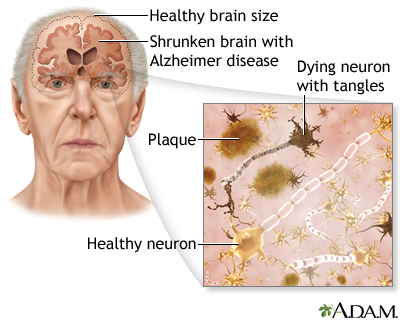Health Library
Dementia and driving
Images

I Would Like to Learn About:
What to Expect at Home
If your loved one has dementia, deciding when they can no longer drive may be difficult. They may react in different ways.
- They may be aware they are having problems, and they may be relieved to stop driving.
- They may feel their independence is being taken away and object to stopping driving.
Signs That Driving may no Longer be Safe
People with signs of dementia should have regular driving tests. Even if they pass a driving test, they should be retested in 6 months.
If your loved one does not want you getting involved in their driving, get help from their health care provider, lawyer, or other family members.
Even before you see driving problems in someone with dementia, look for signs that the person may not be able to drive safely, such as:
- Forgetting recent events
- Mood swings or getting angry more easily
- Problems doing more than one task at a time
- Problems judging distance
- Trouble making decisions and solving problems
- Becoming confused more easily
Signs that driving may be getting more dangerous include:
- Getting lost on familiar roads
- Reacting more slowly in traffic
- Driving too slowly or stopping for no reason
- Not noticing or paying attention to traffic signs
- Taking chances on the road
- Drifting into other lanes
- Getting more agitated in traffic
- Getting scrapes or dents on the car
- Having trouble parking
Steps to Take
It may help to set limits when driving problems start.
- Stay off busy roads, or do not drive at times of the day when traffic is heaviest.
- Do not drive at night when it is hard to see landmarks.
- Do not drive when the weather is bad.
- Do not drive long distances.
- Drive only on roads the person is used to.
Caregivers should try to lessen the person's need to drive without making them feel isolated. Have someone deliver groceries, meals, or prescriptions to their home. Find a barber or hairdresser who will make home visits. Arrange for family and friends to visit and take them out for a few hours at a time.
Plan other ways to get your loved one to places where they need to go. Family members or friends, buses, taxis, and senior transportation services may be available.
As danger to others or to your loved one increases, you may need to prevent them from being able to use the car. Ways to do this include:
- Hiding the car keys
- Disabling car keys so that the car will not start
- Disabling the car so it will not start
- Selling the car
- Storing the car away from the home
Related Information
Brain aneurysm repairStroke
Dementia
Alzheimer disease
Communicating with someone with aphasia
Dementia - behavior and sleep problems
Dementia - daily care
Dementia - keeping safe in the home
Dry mouth during cancer treatment
Communicating with someone with dysarthria
Stroke - discharge
Dementia - what to ask your doctor
References
Budson AE, Solomon PR. Life adjustments for memory loss, Alzheimer's disease, and dementia. In: Budson AE, Solomon PR, eds. Memory Loss, Alzheimer's Disease, and Dementia. 3rd ed. Philadelphia, PA: Elsevier; 2022:chap 28.
Carr DB, O'Neill D. Mobility and safety issues in drivers with dementia. Int Psychogeriatr. 2015;27(10):1613-1622. PMID: 26111454 pubmed.ncbi.nlm.nih.gov/26111454/.
National Institute on Aging. Driving Safety and Alzheimer's Disease. www.nia.nih.gov/health/driving-safety-and-alzheimers-disease. Updated April 8, 2020. Accessed August 8, 2022.
BACK TO TOPReview Date: 4/17/2022
Reviewed By: David C. Dugdale, III, MD, Professor of Medicine, Division of General Medicine, Department of Medicine, University of Washington School of Medicine, Seattle, WA. Also reviewed by David Zieve, MD, MHA, Medical Director, Brenda Conaway, Editorial Director, and the A.D.A.M. Editorial team.
 | A.D.A.M., Inc. is accredited by URAC, for Health Content Provider (www.urac.org). URAC's accreditation program is an independent audit to verify that A.D.A.M. follows rigorous standards of quality and accountability. A.D.A.M. is among the first to achieve this important distinction for online health information and services. Learn more about A.D.A.M.'s editorial policy, editorial process and privacy policy. A.D.A.M. is also a founding member of Hi-Ethics. This site complies with the HONcode standard for trustworthy health information: verify here. |
The information provided herein should not be used during any medical emergency or for the diagnosis or treatment of any medical condition. A licensed medical professional should be consulted for diagnosis and treatment of any and all medical conditions. Links to other sites are provided for information only -- they do not constitute endorsements of those other sites. © 1997- 2022 A.D.A.M., a business unit of Ebix, Inc. Any duplication or distribution of the information contained herein is strictly prohibited.
